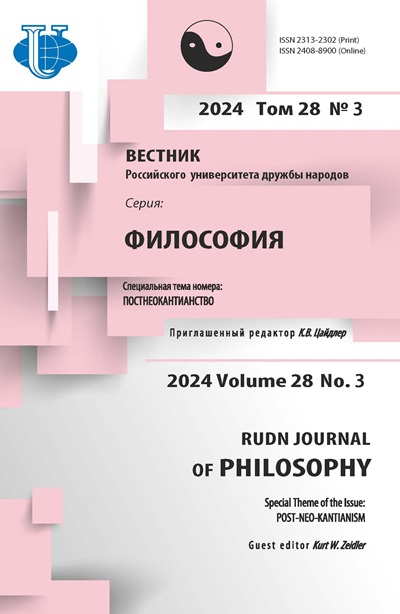Что такое постнеокантианство?
- Авторы: Норас А.Я.1
-
Учреждения:
- Силезский университет в Катовицах
- Выпуск: Том 24, № 1 (2020): ИСЛАМСКАЯ ФИЛОСОФИЯ
- Страницы: 89-98
- Раздел: ИСТОРИЯ ФИЛОСОФИИ
- URL: https://journals.rudn.ru/philosophy/article/view/23094
- DOI: https://doi.org/10.22363/2313-2302-2020-24-1-89-98
Цитировать
Полный текст
Аннотация
В статье осуществляется попытка определить понятие «постнеокантианство», исходя из характера его отношения к понятию «неокантианство». С этой целью автором ставятся следующие задачи: охарактеризовать феномен неокантианства, указать на проблемы его определения, выявить актуальность термина «постнеокантианство», в особенности его отношения к философии И. Канта. Автор подчеркивает необходимость введения данного термина в классификацию философии XX в. целесообразностью выстраивания модели «кантианство - неокантианство - неонеокантианство - постнеокантианство», где каждый новый этап обусловливается характером рефлексирования мыслителей некоторого периода над принципиальными для философии проблемами, сформулированных в кантовских «Критиках». Среди постнеокантианцев в концепции автора находятся мыслители, традиционно причисляемые к немецким феноменологам, такие как Э. Гуссерль и М. Хайдеггер: именно начиная с философской концепции Гуссерля можно говорить о появлении постнеокантианства, а семантически верная интерпретация Хайдеггера, по мнению автора, наиболее отчетливо понимается в рамках Баденского неокантианства. Исследуя феномен постнеокантианства, устанавливается необходимость требования ответа на вопрос относительно предшествующей ему традиции неокантианства, внутри которой существует неразрешенный до сих пор в истории философии ряд противоречий относительно классификации неокантианских школ и различения двух периодов неокантианства: раннего (классического) и позднего («правильного»). Неокантианство показывает актуальность кантовской философии, выделяя непрекращающийся спор о понимании кантовской «Критики чистого разума». Постнеокантианство играет важную роль с точки зрения перспективы современных исследований Канта, к которым относятся Готфрид Мартин, Манфред Брелаге или Ханс-Михаэль Баумгартнер.
Ключевые слова
Об авторах
Анджей Ян Норас
Силезский университет в Катовицах
Автор, ответственный за переписку.
Email: a.noras@awf.katowice.pl
доктор философии, профессор
Bankowa 12, Katowice 40-007, PolandСписок литературы
- Heidegger M. Gesamtausgabe. I. Abteilung: Veröffentlichte Schriften 1910-1976. Bd. 3: Kant und das Problem der Metaphysik, hrsg. von F.-W. von Herrmann. Frankfurt am Main; 1991. P. 274-296. (In German).
- Über Ernst Cassirers Philosophie der symbolischen Formen. Hrsg von H-J. Braun u. a. Frankfurt am Main; 1988. P. 290-302. (In German).
- Noras AJ. Kant a neokantyzm badeński i marburski, Katowice; 2002. (In Polish).
- Ueberwegs F. Grundriss der Geschichte der Philosophie. Vierter Teil: Die deutsche Philosophie des XIX. Jahrhunderts und der Gegenwart, Hrsg. von TK Oesterreich. 13. Aufl. Basel; 1951. P. 417. (In German).
- Windelband W. Vorwort. In: Präludien. Aufsätze und Reden zur Philosophie und ihrer Geschichte. 9. Aufl., 1. Bd. P. IV. Tübingen; 1924. (In German).
- Windelband W. Nach hundert Jahren (Zu Kants hundertjährigem Todestage). In: Präludien. Aufsätze und Reden zur Philosophie und ihrer Geschichte. 9. Aufl., 1. Bd. P. IV. Tübingen; 1924. P. 147-148. (In German).
- Natorp P. Kant und die Marburger Schule. Kant-Studien. 1912;(17):193. (In German).
- Köhnke KCh. Entstehung und Aufstieg des Neukantianismus: Die deutsche Universitätsphilosophie zwischen Idealismus und Positivismus. Frankfurt am Main; 1993. P. 62.
- Schnädelbach H. Geschichtsphilosophie nach Hegel. Die Probleme des Historismus. Freiburg-München; 1974. (In German).
- Schnädelbach H. Philosophie in Deutschland 1831-1933.8. Aufl. Frankfurt am Main; 2013. P. 49-87. (In German).
- Cohen H. Kants Theorie der Erfahrung. 3 Aufl. Berlin; 1918. P. XI. (In German).
- Schnädelbach H. „Erkenntnis der Erkenntnis”? Eine Verteidigung der Erkenntnistheorie. In: Philosophie in der modernen Kultur. Vorträge und Abhandlungen 3. Frankfurt am Main; 2000. P. 165. (In German).
- Noras AJ. O relacji: Kant - neokantyzm - Husserl. Psychologizm - antypsychologizm. W setną rocznicę wydania Logische Untersuchungen Edmunda Husserla. Red. A. Olech. Kraków; 2001. P. 13-28. (In Polish).
- Heidegger M. Kant and the problem of metaphysics. Trans. by JB Churchill. Bloomington; 1965. (In German).
- Davoser Disputation zwischen Ernst Cassirer und Martin Heidegger. Op. cit. P. 274. (In German).
- Baumgartner H-M. Endliche Vernunft: zur Verständigung der Philosophie über sich selbst. Bonn; 1991. (In German).
- Fichte JG. The science of knowledge. Translated by Kroeger AE. Philadelphia; 1868. 1. 269. (In German).
- Flach W. Die Gegenstandsund Aprioritätsproblematik bei H. Rickert, B. Bauch und Nic. Hartmann. Systematische Untersuchungen zur Grundlegungsthematik der reinen Geltungslogik. Diss. Würzburg; 1955. (In German).
- Ollig H-L. Der Neukantianismus. Stuttgart; 1979. (In German).
- Zocher R. Die philosophische Grundlehre. Eine Studie zur Kritik der Ontologie, Tübingen; 1939. (In German).
- Wagner H. Philosophie und Reflexion. München-Basel; 1959. P. 114.
- Flach W. Grundzüge der Erkenntnislehre: Erkenntniskritik, Logik, Methodologie. Würzburg; 1994. (In German).
















